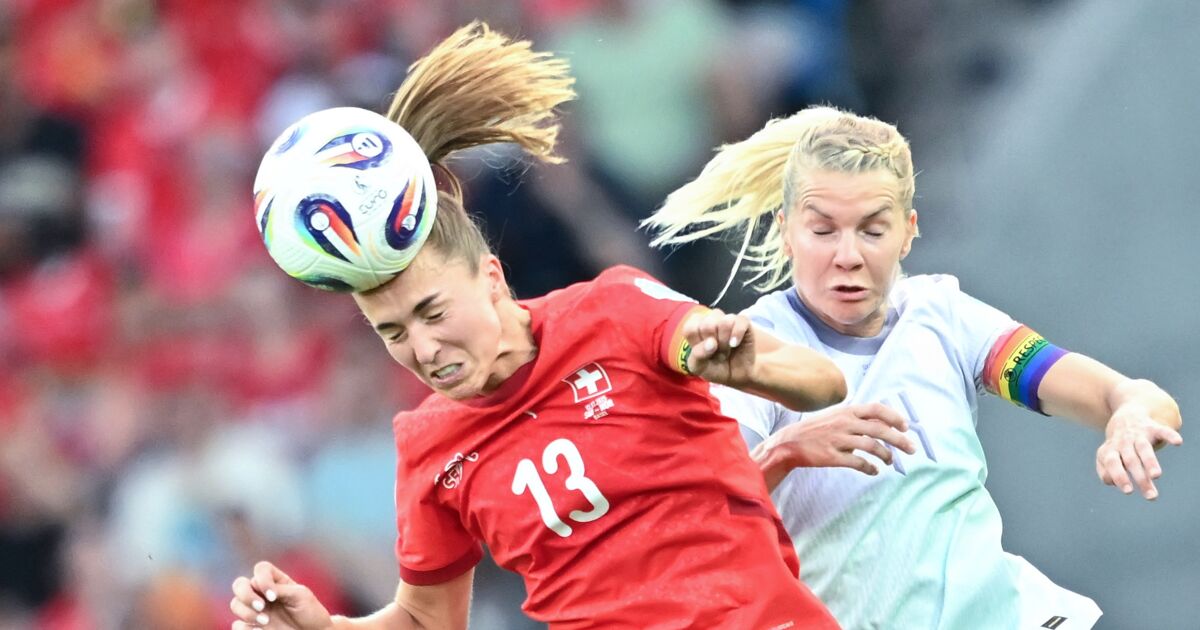LGBTQ Pride rainbow armbands return for Euro 2025, after FIFA blocked them at World Cups
The captains of Norway and hosts Switzerland went with rainbow at the Women’s Euro, and so will Germany’s Giulia Gwinn. The post LGBTQ Pride rainbow armbands return for Euro 2025, after FIFA blocked them at World Cups appeared first on Outsports.

For a mandatory piece of equipment that simply symbolizes inclusive leadership, the rainbow captain’s armband has found itself in sport’s firing line in recent years.
However, the colorful wraparound is back in vogue at the UEFA Women’s Euro, with Lia Walti and Ada Hegerberg — the skippers of hosts Switzerland and former champions Norway respectively — both selecting it to wear on opening night instead of the standard-issue designs.
Meanwhile, Germany captain Giulia Gwinn confirmed to the media before her team’s game against Poland on Friday that she would also be going with rainbow.
Get off the sidelines and into the game
Our weekly playbook is packed with everything from locker room chatter to pressing LGBTQ sports issues.
Subscribe to our Newsletter today
According to the German Press Agency (DPA), it was the German FA who secured approval for the armband from UEFA as an alternative to the confederation’s “Respect” designs in yellow or blue.
“For us, it’s great that it’s been made possible to wear the rainbow armband,” Gwinn told reporters at Germany’s training base camp in Zurich.
She has been sporting it in recent warm-up matches, and added: “There was never any question of changing the armband, if the opportunity arose.
“Our team stands for so many things, and we want to convey these values to the outside world.”
More than a fifth of all players named in squads for Euro 2025 are publicly out as LGBTQ. The decision to permit the rainbow armband comes after a Pride Month which UEFA are not known to have acknowledged on social media.
Related
At least 78 out LGBTQ players will be competing in UEFA Women’s Euro 2025
There are 368 players in the squads for the UEFA Women’s Euro in Switzerland. More than a fifth are publicly out as LGBTQ.
Outsports cannot recall the Pride flag armband being used at a major men’s or women’s international tournament for three years. England captain Leah Williamson wore the rainbow version throughout Euro 2022, leading the Lionesses to glory on home soil.
In that tournament, other national teams including Germany, Northern Ireland and Sweden did the same, while the Netherlands used its own ‘OneLove’ armband design which had different colored stripes and was intended to represent diversity more broadly.
It was the ‘OneLove’ armband which would cause controversy later in the year when eight European national associations announced plans for their teams to use it at the men’s FIFA World Cup in Qatar.
On the eve of the tournament, the associations were told that only FIFA-issued armbands were authorized, and that they risked potential punishment if they ignored the instruction.
Despite not being a Pride rainbow, the ‘OneLove’ armband’s use in Qatar had become interpreted as a tacit statement against LGBTQ human rights abuses in the Gulf state, with the hosts putting pressure on FIFA to block it.
England were the first of the European teams to play, and backed down just hours before kick-off, with Harry Kane wearing an armband with ‘Respect’ written on it instead.
Two days later, Germany responded by covering their mouths with their hands, implying they had been ‘silenced’ by FIFA.
Armbands after Qatar 2022, including Progress Pride in Paris
Midway through the following year, several teams at the Women’s World Cup in Australia and New Zealand were expecting to wear the Pride rainbow armband, only to discover it had been left off a range of options made available to captains by FIFA.
Rainbows at Euro 2025!
Several captains, including Germany's Giulia Gwinn will wear the rainbow captain’s armbandFIFA has banned the symbol of diversity but UEFA has no problem with it
#WEURO2025 pic.twitter.com/qDG0BrqOQT— DW Sports (@dw_sports) July 3, 2025
Tellingly, the ‘OneLove’ colors that were seemingly so unacceptable in Qatar were brought back, in a FIFA-branded “Unite for Inclusion” design.
Matildas star Sam Kerr, one of at least 96 out LGBTQ players at the tournament, said she would have chosen to wear the Pride version, but that it wasn’t “worth the risk” due to the possibility of disciplinary action.
Later in 2023, even the Dutch FA themselves gave up on ‘OneLove’ and their women’s team has tended to use standard-issue armbands since.
There was no rainbow armband seen at the UEFA men’s Euros last summer, but it did make an appearance at the Paris Olympics — just not in soccer.
Instead, German men’s field hockey captain Mats Grambusch got permission from the International Hockey Federation (FIH) to wear it, with the decision having to be ratified by the IOC.
Netherlands women’s skipper Xan de Waard made an even more emphatic statement of LGBTQ inclusion by leading her country to a gold-medal success while wearing a Progress Pride armband, showing the trans flag colors. Her Dutch teammate, goalkeeper Anne Veenendaal, donned a helmet carrying a Pride Progress flag sticker.
Rainbow armbands returned to the controversy zone in England late last year, during the Premier League’s annual Rainbow Laces campaign activation.
Ipswich’s Egypt international midfielder Sam Morsy stuck with the standard-issue armband, while Crystal Palace counterpart Marc Guehi wrote messages about Jesus on his armband for both of his club’s matches in the designated awareness week. However, captains of the 18 other Premier League teams wore the rainbow with no known issues.
A similar initiative in Belgium at the end of last season called ‘Football for All’ was snubbed by three men’s captains, citing religious or philosophical reasons.
Subscribe to the Outsports newsletter to keep up with your favorite out athletes, inspiring LGBTQ sports stories, and more.
The post LGBTQ Pride rainbow armbands return for Euro 2025, after FIFA blocked them at World Cups appeared first on Outsports.

 Mark
Mark 






